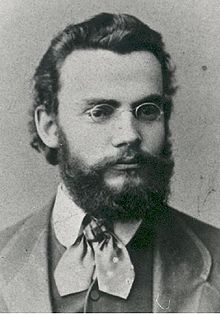Carl Robert Jakobson
Carl Robert Jakobson (born July 26, 1841 in Tartu , † March 19, 1882 in Kurgja, today the municipality of Vändra , Lääne County / Estonia ) was an Estonian publicist, writer and educator. He used the name Linnutaja as a pseudonym .
Early years
Carl Robert Jakobson was born the son of Adam Jakobson, the teacher at the parish -School of Torma was. His younger brother is the xylograph and book illustrator Eduard Magnus Jakobson (1847–1903).
Carl Robert Jakobson received his first lessons privately from his father and at the Torma school. From 1856 to 1859 he attended the renowned seminar of Jānis Cimze in Valga .
Educator and patriot
From 1859 Jakobson worked as his father's successor in the Torma School. In 1862 he got into disputes with the local pastor and the landlord. He then left Torma. Jakobson found employment as a teacher in Jamburg . From 1864 he was a tutor in Saint Petersburg . A year later he received the qualification to teach German and literature .
In Saint Petersburg, Jakobson joined nationalist Estonian circles. He dedicated himself more and more to journalism. In 1865 he began working with the Postimees newspaper and with liberal German-Baltic and Russian newspapers. In 1868 his application for approval of an Estonian newspaper in Saint Petersburg was rejected by the tsarist authorities. Jakobson took an active part in the founding of the Estonian Literature Association ( Eesti Kirjameeste Selts ), which promoted Estonian language and literature in Tartu from 1871 to 1893 . In 1868 and 1870 Jakobson gave a total of three patriotic speeches in the Vanemuine Association , which were published as a book in 1870 and had a major influence on the national awakening in Estonia.
Agriculture
In 1871 Jakobson moved to Tallinn . Here too the authorities refused to allow him to open his own newspaper. From 1872 to 1874 he worked as a publicist in Vändra . In 1874 he bought the Kurgja estate in the immediate vicinity, on which he built a model farm. He was soon elected president of the Pärnu and Viljandi agricultural associations . In his activity he campaigned for the improvement of agriculture and a stronger legal position for the Estonian peasant class.
publicist
From 1878 Jakobson worked for the magazine Sakala in Viljandi. In the sheet, the suppression of the rural population at that time was described very strongly and the aristocracy attacked. Jakobson also called for a greater emancipation of the school system from the church. In particular, his statements aimed at a strong Estonian autonomy were discussed controversially in Estonia. They made him one of the most prominent figures of the era of the Estonian national awakening.
In 1881 Jakobson was elected President of the Estonian Literary Association to succeed Jakob Hurt . He published numerous guides in Estonian for Estonian farmers, which were intended to improve popular education and increase yields. In addition, he published numerous school books for elementary schools that were particularly innovative in terms of pedagogy. Jakobsons editions of choir books with patriotic Estonian songs and nationally-minded poems are famous. His play Artur ja Anna (1872), which denounced the inequalities in the population of Estonia and Livonia , quickly became famous.
Appreciation
Carl Robert Jakobson was one of the most important and radical representatives of the Estonian national awakening. With his radical demands he wanted to achieve equality for Estonians. His opponents were the Baltic German nobles and their traditional privileges. Carl Robert Jakobson was one of the pioneers of an independent Estonian state.
Before the euro was introduced in Estonia, it was featured on the 500 kroner note. In 1948 a museum dedicated to him was set up on his farm in Kurgja. Monuments in Torma (1957) and Viljandi (1993) commemorate him.
Most important works
- Kooli Lugemise raamatu (1867–1876)
- Uus Aabitsaraamat (1867)
- Veikene Geograafia (1868)
- Teadus ja Seadus põllul (1869)
- Wanemuine Kandle healed (songs for choir, 1869–1871)
- CR Linnutaja laulud (song book, 1870)
- Rõõmus laulja (1872)
- Artur ja Anna (play, 1872)
- Kuidas põllumees rikkaks saab (1874)
- Kuidas karjad ja nende saagid meie põllumeeste rikkuse allikaks saavad (1876)
- Sakala calendar põllumeestele (1880)
- Helmed ( reader , 1880)
Web links
- Carl Robert Jakobson Museum of Kurgja (Estonian)
| personal data | |
|---|---|
| SURNAME | Jakobson, Carl Robert |
| ALTERNATIVE NAMES | Linnutaja |
| BRIEF DESCRIPTION | Estonian publicist, journalist and popular educator |
| DATE OF BIRTH | July 26, 1841 |
| PLACE OF BIRTH | Tartu |
| DATE OF DEATH | March 19, 1882 |
| Place of death | St. Petersburg |
